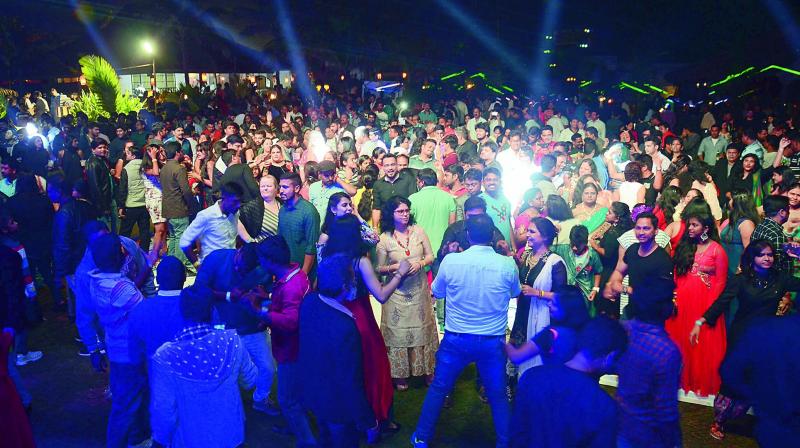New Year 2017: Promises and hopes
As the New Year begins, scientists hold out hope of new discoveries, the Police promises a better show in 2017.

State will get invisible police: The Andhra Pradesh force will make the invisible police and visible policing a reality in the year 2017, said DGP N. Sambasivarao on Saturday. In his year-end report, he said the police department was on a path towards transformation using new technologies and was in the process of re-skilling the entire department. He said Andhra Pradesh was faring better in many crucial categories when compared to other states in the country but admitted that it needed improvement in a few areas such as caste-related violence and conflicts between various groups.
The DGP said that according to the National Crime records Bureau, AP was second on a nation-wide study which surveyed clashes between caste groups. He said the government was working towards tackling the problem.
The DGP added that the police force were not conducting district-wise crime mapping. He said correctional measures would be put in place to reduce the crime rate, which had dipped slightly by 0.65 per cent in 2016, when compared to 2015. But rising crimes against women — an increase of 10.83 per cent — was an area of concern for the police, he said. About cyber crimes, the DGP said numbers had risen 13 per cent and Visakha-patnam topped the list.
Road accidents too had increased by 2.5 per cent in 2016 and a total of 7,836 people died in mishaps across the state this year. Mr Sambasivarao said the police department will be soon be introducing an intelligent traffic management system in the state and a voice-enabled mobile application which alerts drivers whenever they enter accident-prone areas along the Vijayawada – Visakhapatnam sector.
About red sanders smuggling, Mr. Sambasiva Rao said the police had made considerable progress. He added that cops had booked 384 cases and arrested 2,239 smugglers. He said the task force that was created to control smuggling had given good results. The DGP did not reveal much on possible regulations on cockfights.
Happening this year:
New Governor for AP and TS:
The term of Governor E.S.L. Narasimhan will end in May. Mr Narasimhan was first appointed as Governor of Chhattisgarh in 2007 transferred to undivided AP State in December 2009. In 2012, he was reappointed for a fresh term. After bifurcation, he became the Governor of TS and AP. The High Court could get a permanent Chief Justice; Justice Ramesh Ranganathan is the acting Chief Justice.
Assembly buildings:
New Assembly Buildings for AP will function from Velagapudi, in the temporary capital area. Presently Assembly sessions are being held from Hyderabad in the existing Assembly buildings.
Irrigation schemes:
Muchumarri lift scheme from River Krishna to supply waters to KC Canal system will be inaugurated in 2017. Gandikota Reservoir and supply of Krishna waters to Pulivendula area on Kadapa district to happen this year.
MCI may be scrapped:
Medical Council of India to be scrapped? Doctors are very upset because the government want's to abolish the existing MCI and set up a new body which will also have non-medical members. All the doctors are very upset and have strongly protested against this. This is going to be a major contentious issue between the doctors and the Centre.
What economists see in 2017:
FUEL PRICES:
There has been major hype about a possible tremor in the crude prices after the recent OPEC meet but:
Despite a supply cut by OPEC and non-OPEC countries, crude oil may not cross $60-$65 a barrel. The party-poopers for OPEC in this case are resumption of US shale oil production, beginning of oil supplies from Libya, global slowdown and a strong dollar.
India, the third biggest consumer of crude oil in the world, is said to be comfortable with $60 price tag. So we don’t have to worry about petrol bills going up.
The big GST still remains a mystery:
Despite opposition from some states, the GST regime will come into being this year, if not in April as announced, then definitely in the latter part of 2017.
While GST is the biggest reform in India since the liberalisation of the economy in the 1990s, it is expected to be harsh on the consumer’s pockets in the short-run.
GST has four slabs: 5 per cent, 12 per cent, 18 per cent and 28 per cent. The standard rates of most goods and services will be in the 12 and 18 per cent slabs.
Most services are expected to attract 18 per cent tax as against 15 per cent service tax that we pay now. So, you will be paying three per cent more on eating out, travel agent costs, cable services, telephony, construction, etc. White goods such as air-conditioners, refrigerators, washing machines and audio equipment could become cheaper as they will attract 28 per cent tax as compared to the 31 per cent presently.

